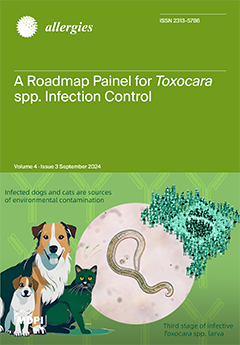This study was conducted using data from the SCAALA (Social Change Asthma and Allergy in Latin America) cohort in Brazil from 2005 to 2013. We examined the seroprevalence and risk factors of toxocariasis, a parasitic infection leading to conditions such as visceral larva
[...] Read more.
This study was conducted using data from the SCAALA (Social Change Asthma and Allergy in Latin America) cohort in Brazil from 2005 to 2013. We examined the seroprevalence and risk factors of toxocariasis, a parasitic infection leading to conditions such as visceral larva migrans, utilizing an indirect ELISA with
T. canis antigens, alongside with data from questionnaires, eosinophil counts, sIgE to aeroallergens, IL-10 levels, and Skin Prick Test results; the research provided insights into the disease’s dynamics. The prevalence of anti-
Toxocara spp. IgG increased from 48% to 53% over the studied period, with a 25% increase in new cases in 2013. The significant risk factors included age and pet exposure, while higher maternal education and living on paved streets were found to offer protection. The study uncovered a complex interaction between
Toxocara spp. infection and the immune system, indicating that the infection could both trigger inflammation and modulate skin reactions. Based on these findings, the study proposed a roadmap for controlling toxocariasis, which includes strategies such as enhancing public education about the disease and preventive measures, improving environmental sanitation, strengthening veterinary control measures like pet deworming, increasing access to healthcare and screening, and implementing community-based interventions to address the identified risk factors. These measures aim to reduce the prevalence of toxocariasis and its impact on public health by addressing environmental and socioeconomic risk factors, providing a pathway to significantly reduce the burden of this parasitic infection.
Full article




